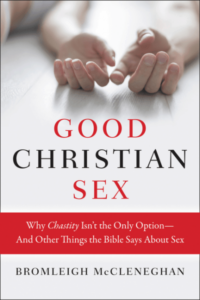My wife was very curious when she glanced over at my nightstand a few weeks ago to see Good Christian Sex across the spine of a book I’d recently been sent to review. That was some interesting conversation for sure. But as someone who used to teach Ethics at a Christian university, I too was curious when we were first approached about being part of a blog tour for the book. I was especially intrigued by the subtitle:
 GOOD CHRISTIAN SEX
GOOD CHRISTIAN SEX
Why Chastity Isn’t the Only Option — And Other Things the Bible Says About Sex
by Bromliegh McCleneghan
I was hopeful that the book would take a fresh and popular look at sexual ethics from a Christian point of view and it does. It’s a whimsical and largely anecdotal look at sexual ethics from a mainline Protestant point of view. As such, it was a fun read and an interesting perspective that I appreciated learning about.
Her ability to normalize everyday experiences of Christian teenagers and twentysomethings is commendable. I also deeply appreciated hearing from female theologians and McCleneghan’s awareness (and often de-centering herself) as someone who is cis-gendered and heterosexual. For all these reasons, I hope many read the book.
My challenge for the book comes in that “Other things the Bible says about sex” part.
I am well aware that I am likely not the primary audience for this book. That’s an important thing to remember. But for me, I was hoping for a creative look at the biblical text based on the subtitle. If the book was setup as a “theological look” or a “personal look” at Christian sexual ethics, it’s a homerun. But as I reflect now, I learned a lot more about what Gudorf and Farley say about sex than I did about what the Bible says about sex.
Don’t get me wrong, the Bible is brought in quite a bit. It’s just that when it’s mentioned, it’s largely verses about larger ethical themes like love and justice that seem to be there to prop-up the already in progress argument and less about “things the Bible says about sex.” There was no hermeneutical bridge to help people who interpret the Bible more “literally” understand where she was coming from with how she treated the text. And because of that, most of her “arguments” fell a little flat. But again, maybe trying to convince people that the Bible says something other than what they were assuming it says, wasn’t the point. But then, why the subtitle? Am I being too analytical? Probably.
For example, on page 144, she says, “I’ve always wondered what to do with the apostle Paul’s condemnation of “fornication” in that letter to the church at Corinth (6:18 in particular) . . . Fornication is traditionally seen as extramarital sex. But that seems both overly broad and overly narrow . . . “Sexual immorality” is similary all-inclusive, and unhelpfully vague. What makes something immoral?”
Great setup. But at no point in the rest of the chapter is the Bible quoted and only once (8 pages later) is it even mentioned. Trying to bring the Bible into it feels forced and awkward.
All that to say, if we are looking at the primarily arguments of the book, my mainline Protestant brothers and sisters will hopefully find it a fun and interesting book that will likely give voice to many of the things they were already feeling about sex and the Bible. And my Evangelical brothers and sisters will find it largely unconvincing. But here’s to more conversations about Christianity and sex. And here’s to McCleneghan for having the courage to be part of that conversation and open up about her own journey to do it.
